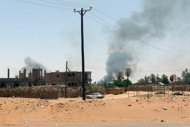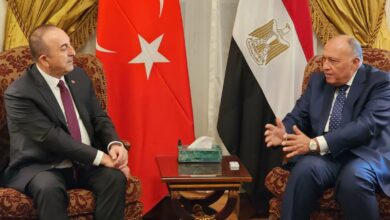
BENGHAZI — The leader of one of Libya's most powerful militia groups played down the prospect of changes in its operations now that the central government has put a military officer in command, saying the group's role would continue as before.
Rafallah al-Sahati is one of the three most powerful armed groups in eastern Libya, operating with the permission of the central government while the mainstream security forces remain weak a year after the civil war that toppled Muammar Gaddafi.
The continued might of the militia groups has provoked public unrest, most recently on Friday night when a mob of pro-government demonstrators first swept the armed Islamist group Ansar al-Sharia out of its Benghazi bases and later turned against Rafallah al-Sahati.
The crowd stormed a Rafallah base, looting weapons and provoking clashes. Eleven people were killed.
The government announced on Monday it was putting uniformed army colonels in charge of Rafallah al-Sahati and the larger 17 February brigade as part of measures to regularize the forces.
But Rafallah al-Sahati leader Ismail al-Sallabi told Reuters on Wednesday the officer who had now assumed command, Colonel Salahadeen Bin Omran, had already been a member of the militia group and was simply being promoted internally to a higher-profile role.
"That colonel is one of us. We have a lot of army colonels with us. He is one of the army colonels who is also a revolutionary, and once of the first colonels that came to fight with us," said Sallabi, who entered his living room walking with a limp from a bullet wound he received in his leg in Friday night's clash.
Sallabi, whose leadership of the militia has made him one of the most powerful men in eastern Libya, described himself as "a student and a businessman", and made no attempt to deny that he would continue to play some kind of leadership role for now, despite the formal change of command.
"I am not going to lie to you: I will have a role, either within Rafallah al-Sahati or outside it," he said, without giving more details.
"I am a civilian. I am not a military man, and personally, I do not want to be a military man. At some stage things will calm down, and I will be able to withdraw from public life."
Two-track approach
The weak Libyan government's campaign to rein in the militias has received a stronger impetus since the killing of US Ambassador Christopher Stevens and three other Americans in an attack on the US consulate in Benghazi on 11 September.
The government has since pursued a two-track approach, dissolving those militias like Ansar al-Sharia that lacked official permission, while announcing less confrontational measures to increase control over those armed groups that have accepted an official role.
"You must know that Rafallah al-Sahati is part of the government itself. Rafallah al-Sahati is part of the core of the new army. We have started integrating Rafallah al-Sahati into the army a long time ago," Sallabi said, a theme that he repeated several times during the course of his interview.
He accused officers from the regular army with what he referred to as ties to the former Gaddafi government of sending the crowd to attack his group on Friday night.
"They had loudspeakers with microphones telling people to go to Rafallah al-Sahati," Sallabi said.
"The army people who want to quarrel with us are not following the orders of the military chief of staff and are not satisfied with the revolutionaries becoming the core of the army."
He suffered his wound after meeting the approaching crowd to try to calm them down, two kilometers (one mile) from the gates of his compound, he said. The crowd had greeted him warmly, he said, but someone opened fire on his car when he got back in.
Arrests by militia, which are seen by many Libyans as semi-official abductions, are the cause of much of the public hostility to the groups.
Sallabi said his group did not operate its own jail. It had captured 113 suspected looters and attackers before dawn on Saturday after the overnight clash, including 30-40 military officers, and had turned them over to 17 February, a larger militia which has an agreement with the government allowing it to hold detainees, he said.
"From the very beginning we have been working to get legal legitimacy, and that is what distinguishes us from the other revolutionaries," he said.




